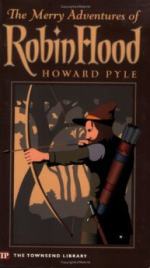|
This section contains 321 words (approx. 1 page at 400 words per page) |

|
Pyle's instinct to present a tightly woven plot does not desert him in The Merry Adventures of Robin Hood. His sources for the book were a loose collection of ancient ballads about Robin Hood. These ballads rarely suggest motives for human actions or provide any sense of cause and effect. Pyle, however, clarifies both logic and character motivations, thereby weaving the ballads into a coherent story. Through frequent summaries and forecasts and by internal references to previous adventures, Pyle binds his material so seamlessly that the reader forgets these tales were originally only loosely related.
The success of Pyle's Robin Hood depends not only on his skillful splicing of the medieval ballads but also on his creation of a narrator whose enthusiasm reflects genuine pleasure in telling the tales. This narrator is witty, colloquial, and genial. His language is rich in striking metaphors, poetic rhythms, and...
|
This section contains 321 words (approx. 1 page at 400 words per page) |

|




